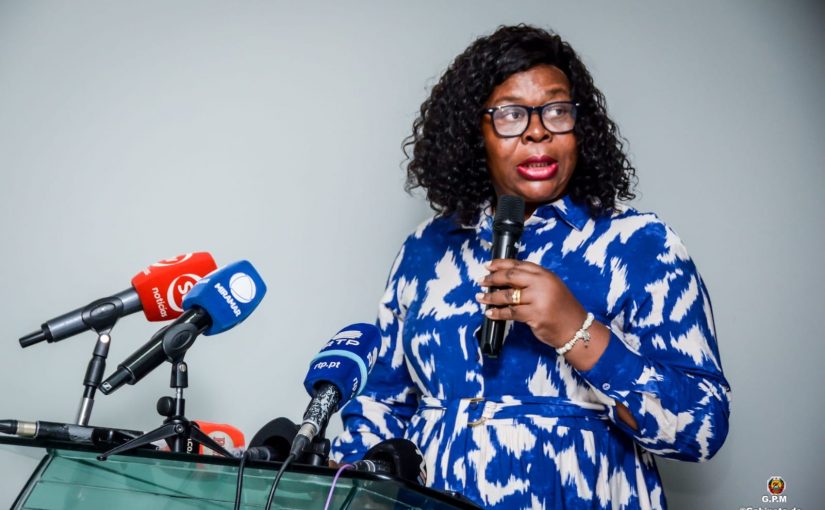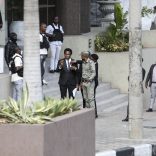Chapo calls for free movement between Mozambique and Portugal
Mozambique: GABINFO calls for vote of confidence on media bills, but others are sceptical

Photo: Jornal Moçambique
The Director of the Mozambican government’s press office (GABINFO), Emilia Moiane, on Friday called for a vote of confidence from all media stakeholders for updating the legislation on the media and on broadcasting.
She was speaking in Maputo at the end of the “face-to-face” phase of the public consultation over two new media bills, one on the mass media in general, and the second on broadcasting. Moiane promised that the government will not work alone on revising the legislation, but that its partners, including the National Union of Journalists (SNJ), and the constitutionally enshrined media watchdog, the Higher Mass Media Council (CSCS), will also participate in compiling the final document.
The current press law dates from 1991, following the new Constitution of 1990, which scrapped the one-party state and embraced political pluralism. The 1991 law was welcomed by journalists, since it outlawed censorship, and declared that the public sector media must be independent from all forms of political interference.
The 1991 law ended the effective state monopoly on broadcasting. In the ensuing decades, independent, private media have flourished, not only in print, but also in radio and broadcasting.
The 1991 law was one of the most liberal pieces of press legislation, not only in Africa, but anywhere in the world. Nonetheless, officials such as Moiane are calling for “modernisation”.
Much of the content of the new bills is controversial, and on Friday the Mozambican chapter of the regional press freedom body MISA (Media Institute of Southern Africa) called for them to be rewritten.
The Executive Director of MISA-Mozambique, Ernesto Nhanale, warned that the bills contain ambiguities that could compromise press freedom, and limit the exercise of journalism.
He pointed out that the bill places the President of the Republic above the law. In cases of alleged defamation of the President, the facts would be no defence. Even if everything the journalist wrote about the President were true, he could still be sentenced for libel.
“This measure is a setback for public scrutiny of political leadership and threatens the role of journalism in holding power to account”, warned Nhanale.
MISA also warned of the possibility, under this bill, of the State holding shares in private media companies, which could compromise the constitutional principle of pluralism and open the door to political control of the media.
“This could lead to a loss of independence and autonomy of the media,” Nhanale warned.
The bill seeks, for the first time, to introduce a system of licensing journalists. It is not yet clear how this would work – except that unlicensed journalists might find themselves unable to practice journalism.
Although international press freedom organisations are generally opposed to the licensing of journalists, many Mozambican journalists seem to accept the idea on the grounds that it would weed out charlatans.
One of the country’s foremost journalists, Tomas Vieira Mario, did not hide his skepticism about the bills. Attempts to rewrite the media legislation have been under way since 2006, he noted, in a post on his Facebook page. There have been more than five versions of the bills, each one “worse than the preceding version”.
He had participated, first as chairperson of MISA-Mozambique (2005-2010) and then as chairperson of the CSCS (2015-2021), but then found that the government ignored much of the consensus achieved in the debates. In particular, the government slipped into the bills “a media regulatory body subordinate to the government”, which Vieira Mario believed would be “an institution for the political control of the media”.
The CSCS, at the request of the parliamentary Legal Affairs Commission, rejected the government’s proposal. Now the government has come back with new proposals for consultation. “These proposals are different from the previous ones”, said Vieira Maria, “but there is no clarity about what has changed and why”.
He regarded the new bills as a shoddy piece of work which even bungled the Portuguese language.
Like MISA, Vieira Mario noted that the bills raise the President above the law, and make journalists liable to libel suits, even if all they write about the President is true.
The bill insists on a new regulatory body, with no explanation as to how it will liaise with the CSCS which, unlike the proposed new body, is envisaged in the Constitution.
Far from defending press freedom, warns Vieira Mario, the bills contain a long list of restrictions on journalists’ rights, some of them unclear and ambiguous.
“If at the end of the consultation procedure, the final documents are drawn up by an unknown group, which makes proposals that do not reflect any of the consensus achieved – then what was the use of these consultations?”, concluded Vieira Mario.












Leave a Reply
Be the First to Comment!
You must be logged in to post a comment.
You must be logged in to post a comment.